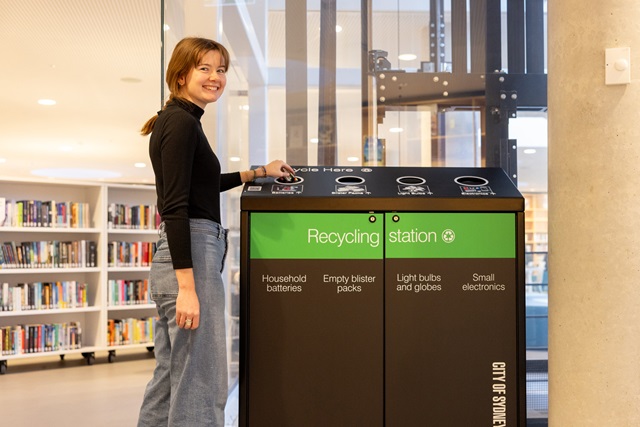Recycle batteries, mobile phones and light bulbs
Learn how to recycle these items in the easiest and most convenient ways.
When you need to do this
If you have old batteries, mobile phones or light bulbs, you can recycle them safely using the options below.
Christmas and new year opening hours
Find out when our services and programs will be open over the Christmas and new year period.

How to recycle batteries
Never throw any batteries in your household rubbish or recycling bins. Batteries, especially lithium-ion batteries, can start fires in bins, waste and recycling collection vehicles and at processing facilities.
Instead, recycle batteries safely using the information below. Always follow the safety advice and tape battery terminals to reduce fire hazards.
Battery safety
These safety tips apply to all batteries, including AA, AAA, button batteries, lithium-ion/rechargeable batteries and batteries with 2 terminals at the same end, like 9V batteries.
- Tape battery terminals (the end bits) with regular, non-conductive tape, like duct tape, clear sticky tape or electrical tape. It’s important that battery terminals don’t touch each other, as this can cause them to spark and ignite.
- Don’t cover the brand name or battery chemistry information.
- Store used batteries in a clearly labelled glass container. Make sure the container is not airtight, as pressure can build up. Don’t store batteries in a paper bag, in a metal container, or with metal objects as this creates a fire hazard.
- Keep batteries in a cool, dry place, away from a heat source. For example, don’t store them in direct sunlight or near the microwave.
- Keep batteries away from children, especially small batteries that can be swallowed, such as button batteries.
- Transport used batteries to a drop-off point in a glass container. Empty your batteries at the drop-off point and take your glass container home to reuse for collecting more batteries.
- Don’t remove batteries that are embedded in or hard to remove from a product. Think mobile phone, laptop and vape batteries. Instead, leave the product as is and recycle it through one of our electronics recycling services.
- Don’t store batteries longer than 6 months. Drop off your collected batteries regularly.
- Don’t drop off badly damaged, swollen or bulging batteries. Place them in a fireproof container, such as a glass container, and contact a B-cycle accredited collector for advice.
- If a battery catches fire, call 000 (triple zero) immediately, leave the area and close doors to contain the fire and smoke. Battery gases and smoke are toxic and must not be inhaled. Read more on what to do in a battery fire.
How to recycle mobile phones and their accessories
You can recycle all types of mobile phones plus their chargers, cables and headphones through:
- our recycling stations in customer service centres, libraries, community and recreation centres
- our doorstep recycling service
- our Ultimo recycling pop-up
- Recycle It Saturday drop-off events
- MobileMuster collection points – drop-off and free mailing options available.
Don’t worry about removing the batteries from your device. The device can be recycled as is, batteries included.
Don’t forget to delete your data. Make sure all data is permanently wiped from your device before you recycle or give it away.
If your mobile is working, consider finding it a new home first. You could give it away or try advertising online through Facebook Marketplace, Gumtree, eBay, Freecycle or Rosella Street.
How to recycle light bulbs
Always wrap light bulbs in newspaper and transport them in a bag or box so they don't break.

Waste & recycling services
Using recycling stations
After you finish
Our contractor collects and recycles the items locally, using state-of-the-art processes and facilities.
In their next life:
- Old batteries can come back as brand new ones, depending on their chemistry. For example, lead acid batteries contain lead, acid and plastic casings, which can be recycled into new batteries or used in other industrial applications. Alkaline and zinc carbon batteries include zinc and manganese, which can be recycled and used in agricultural fertiliser and steel making.
- Over 90% of mobile phone contents, which includes gold, silver and palladium, can be recovered and returned to the supply chain to make new products.
- Light bulbs can be broken down and recycled into glass wool insulation. The mercury is safely recovered for other uses, such as in thermometers and new electronic devices.
Why it’s important to recycle it right
Recycling your batteries, mobile phones and light bulbs helps capture precious resources, which reduces the need to mine raw materials. The batteries, mobile phones and light bulbs we collect are diverted from landfill and raw materials are recovered and recycled.
Batteries in your rubbish or recycling bin can cause fires in our collection trucks and harm our community. Button batteries left around the home can be accidentally swallowed by children and cause serious injury or death.
If batteries, mobile phones or light bulbs are placed in your yellow or red lid bins, they can contaminate recyclable materials, leach toxic chemicals into our soil and contaminate the source of our drinking water.




